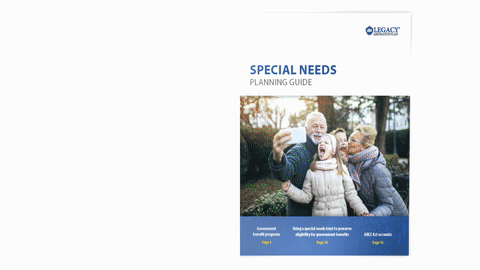Estate planning can be complex for any family, but it becomes particularly crucial when you have both children with special needs and those without. Creating an effective estate plan requires careful consideration of government benefits, tax implications, trust structures and asset distribution strategies. For parents of children with special needs, proper estate planning goes beyond simple asset distribution. It requires a deep understanding of special needs trusts (SNTs), government benefit programs like SSI and Medicaid, tax implications and strategic asset allocation.
What is special needs estate planning?
Special needs estate planning is a specialized approach to the transfer of assets that protects beneficiaries who receive government benefits while ensuring fair distribution among all heirs. This type of planning typically involves creating specific legal structures, such as special needs trusts, that allow a disabled beneficiary to receive an inheritance without losing access to crucial government assistance programs.
The primary goal is to enhance the quality of life for your special needs child while maintaining their eligibility for benefits like Supplemental Security Income (SSI), Medicaid, housing assistance and vocational rehabilitation services. Simultaneously, it ensures that your other children receive their fair share of inheritance in the most tax-efficient manner possible.
How do special needs trusts work?

A special needs trust, also known as a supplemental needs trust (SNT), serves as a protective legal vehicle that holds and manages assets for the benefit of an individual with disabilities. Unlike direct inheritance, assets held in an SNT don't count toward the beneficiary's resource limits for government benefits eligibility.
These third-party trusts can pay for various expenses that enhance the beneficiary's quality of life, including:
- Additional medical care and therapy not covered by government benefits.
- Personal care attendants.
- Education and training programs.
- Entertainment and recreation.
- Travel expenses.
- Special equipment.
- Home furnishings and modifications.
The trustee manages the assets and makes distributions according to the trust's terms, ensuring the beneficiary's needs are met while maintaining their benefits eligibility.
What role does your team of professionals play?
Creating an effective estate plan for families with special needs children typically requires a team of professionals, including:
- An estate planning attorney.
- Financial and tax professionals.
- Government benefits specialist.
- Life care planner.
These professionals can help you comply with complex regulations, optimize tax efficiency and ensure your plan achieves your goals while protecting all your children's interests.


Should inheritance be divided equally among children?
While many parents instinctively want to divide their estate equally among their children, this approach may not always be the most beneficial when special needs are involved. Equal division doesn't necessarily mean equitable distribution, especially considering the unique lifetime needs and circumstances of each child.
Several factors should influence your distribution strategy:
- Lifetime care costs for your special needs child.
- Other children's financial independence and earning capacity.
- Tax implications of different assets.
- Government benefit preservation.
- Family dynamics and relationships.
How should you allocate different types of assets?

Strategic asset allocation plays a crucial role in maximizing the value of inheritance for all children. Different types of assets carry varying tax implications and distribution requirements, particularly when a special needs trust is involved.
For retirement accounts like traditional IRAs, leaving them to a special needs trust can trigger accelerated taxation and reduce the overall inheritance value. Instead, consider leaving these accounts to children without special needs who can take advantage of stretched distributions over their lifetime.
Non-retirement assets like life insurance proceeds, investment accounts or real estate might be better suited for funding a special needs trust, as they typically have more favorable tax treatment and flexibility in distribution.
What are common estate planning mistakes to avoid?
Understanding and avoiding common estate planning mistakes is crucial for families with special needs children. These errors can have long-lasting consequences that affect both the financial security and quality of life for your loved ones. Let's explore in detail the most significant pitfalls and how to prevent them.
One of the most devastating mistakes parents can make is failing to establish a special needs trust. When a child with disabilities receives a direct inheritance, it can immediately disqualify them from essential government benefits like Supplemental Security Income (SSI) and Medicaid. These benefits often provide crucial medical care, housing assistance and basic living expenses. Without proper trust protection, your child might be forced to spend down their inheritance to requalify for benefits, effectively negating the financial security you intended to provide. Additionally, direct inheritance can subject your child to creditors and potential financial exploitation.
The misalignment of beneficiary designations represents another critical error that can undermine even the most carefully crafted estate plan. Many parents don't realize that beneficiary designations on retirement accounts, life insurance policies and other financial instruments override their will or trust documents. For example, if you establish a special needs trust but forget to update your IRA beneficiary designation to name the trust instead of your child directly, the retirement account will bypass the trust entirely and flow directly to your child, potentially triggering benefit disqualification. This mistake often occurs with life insurance policies, where parents name their special needs child as a direct beneficiary without considering the consequences.
The failure to conduct regular plan reviews can also have serious repercussions. Estate plans should be living documents that evolve with changing circumstances. Tax laws frequently change, government benefit programs modify their eligibility requirements and family situations shift over time. For instance, the SECURE Act significantly altered how inherited retirement accounts must be distributed, potentially affecting your planning strategy. Similarly, changes in state Medicaid rules might necessitate adjustments to your special needs trust provisions. Without regular reviews, your estate plan might become outdated and ineffective.
Underestimating lifetime care costs represents a particularly dangerous oversight. Many parents fail to accurately project the long-term expenses associated with caring for a child with special needs. These costs often include specialized medical care, therapeutic services, adaptive equipment, personal care assistance and specialized housing arrangements. Additionally, many parents don't account for inflation or potential changes in care needs as their child ages. For example, a child who currently lives independently might require more intensive support later in life. Without proper financial planning and adequate funding in the special needs trust, your child might face reduced care options or quality of life in the future.
Poor choice of trustees can also undermine your estate plan's effectiveness. Selecting a trustee for a special needs trust requires careful consideration of both technical competence and personal understanding of your child's needs. The trustee must be capable of managing complex financial and legal requirements while also making sensitive decisions about distributions that enhance your child's quality of life without jeopardizing benefits.

Furthermore, many parents overlook the importance of leaving detailed instructions and information for future caregivers and trustees. This includes not just financial information but also comprehensive care instructions, medical history, personal preferences and important contacts. Without this guidance, future caregivers might struggle to provide the level of care and support you envision for your child.
The failure to plan for multiple generations can also create problems. Many parents don't consider what happens to any remaining trust assets after their special needs child passes away. Without proper planning, these assets might pass to unintended beneficiaries or be subject to unnecessary taxation. Additionally, failure to plan for contingencies like the death of a named trustee or guardian can leave your child vulnerable.
Lastly, many parents make the mistake of not involving other family members in the planning process. This can lead to misunderstandings, resentment and potential legal challenges after the parents' death. Clear communication about your planning decisions and the reasoning behind them can help prevent future family conflicts and ensure your wishes are respected and properly implemented.
Understanding and avoiding these common mistakes requires careful planning and regular consultation with experienced professionals. Working with attorneys and financial professionals who specialize in special needs planning can help ensure your estate plan effectively protects your child's financial future while maintaining their eligibility for essential benefits. Regular reviews and updates of your plan will help ensure it continues to meet your family's needs as circumstances change over time.
How can you ensure fair treatment of all children?
Creating an equitable estate plan that serves all your children's needs while maintaining family harmony requires careful consideration and strategic planning. The challenge lies not just in the technical aspects of asset distribution, but in managing family dynamics and expectations while ensuring long-term care for your special needs child.
Effective communication forms the cornerstone of fair estate planning. Parents should initiate ongoing discussions with all their children about the estate plan's structure and purpose. These conversations should begin early and continue regularly, allowing family members to process information, ask questions and express concerns. When explaining why certain children might receive different types or amounts of inheritance, focus on the practical reasons rather than emotional justifications. For example, demonstrate how government benefit rules necessitate special planning structures and explain how these arrangements ultimately benefit the entire family by preserving resources and ensuring proper care for their sibling with special needs.
The selection and preparation of successor trustees requires particular attention when balancing fairness among siblings. While naming siblings as successor trustees can promote family involvement and oversight, it's essential to consider the responsibilities and potential burden this role entails. Some families find success in creating a co-trustee arrangement where one sibling serves alongside a professional trustee, combining family insight with professional expertise. This approach can help prevent resentment while ensuring competent trust administration.
Establishing an advisory committee represents another effective strategy for promoting fairness and family involvement. This committee might include siblings, other family members, health care providers, financial professionals and advocates who can provide input on trust administration decisions. Clear guidelines for the committee's role, meeting frequency and decision-making authority help prevent confusion and conflict while ensuring all perspectives are considered.
How often should you review your estate plan?

Regular review of your estate plan is essential to ensure it remains aligned with your goals and current laws. Consider reviewing your plan:
- Every 3-5 years at minimum.
- After significant life changes.
- When tax laws or government benefit rules change.
- If family dynamics shift.
- When major assets are acquired or sold.
Maintaining an up-to-date estate plan helps ensure your children's futures remain secure and your wishes are carried out effectively.
This comprehensive approach to estate planning requires careful consideration of multiple factors, but the effort invested in creating and maintaining a proper plan provides peace of mind and security for your entire family's future. Regular consultation with qualified professionals can help you navigate these complex decisions while ensuring all your children receive the protection and support they need.



